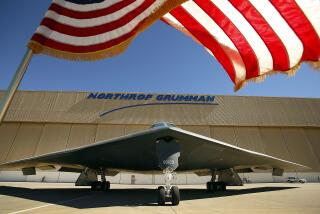Rockwell, TRW Win Major ‘Star Wars’ Contracts : Aerospace: The Air Force awards pacts for surveillance satellite network. Multibillion-dollar program means jobs for Southern California.
- Share via
The Air Force awarded major development contracts to Rockwell International and TRW on Friday to competitively develop a network of surveillance satellites for the Strategic Defense Initiative--assuring that the multibillion-dollar space program and many of its jobs will ultimately be located in Southern California.
The satellite network, known as Brilliant Eyes, would be used to detect the worldwide launch of ballistic missiles, both conventional and nuclear, and provide tracking for U.S. defense weapons to intercept enemy missiles.
Teams led by Lockheed and Martin Marietta were eliminated from the program. The losses marked a stunning setback to Lockheed’s missile and space company in Sunnyvale and to Martin Marietta’s space operations in Denver, two major producers of spy satellites that have boasted recently of their growing market strength in the military satellite business.
Indeed, Rockwell has never won a spy satellite contract, though it is a major technological force in the civilian manned space program. By beating out Lockheed and Martin, the firm scored a major coup. TRW is a major supplier of early warning and electronic eavesdropping satellites.
Rockwell would conduct work at its Downey space unit and said the design effort at its peak would involve 560 jobs, principally in Southern California. TRW, meanwhile, would conduct the design effort at its Redondo Beach-based subsidiary, which would involve 600 jobs in Southern California. Hughes Aircraft’s military satellite division is a partner with TRW. TRW said the award of the Brilliant Eyes contract means local aerospace jobs will be retained. “Although it won’t entail any new hiring, the Brilliant Eyes award does mean jobs will remain here in Southern California,” said Timothy W. Hannemann, executive vice president and general manager of the TRW Space & Electronics Group.
Under the design contracts, each team will build two satellites. They will then compete in a “fly off” by the Air Force to determine a winner. The Air Force did not disclose the ultimate value of the Brilliant Eyes program, but it will undoubtedly be in the billions of dollars.
Observation satellites cost from hundreds of millions of dollars each to more than $1 billion. In addition, after the six-year design phase ends, a more complete development program will have to precede production.
Last month, the Pentagon canceled a $594-million contract for a ground-based tracking system held by McDonnell Douglas Aerospace in Huntington Beach.
The Brilliant Eyes program is part of a global system against limited strikes against the United States. The Pentagon wants to deploy both ground-based and space-based weapons to intercept enemy missiles, but the space-based weapons have encountered significant political resistance.
Other members of the Rockwell team are IBM Corp.’s Federal Systems Co., Boulder, Colo.; Harris Corp.’s Government Aerospace Systems division, Melbourne, Fla.; McDonnell Douglas Corp.’s Delta Launch Vehicle division, Huntington Beach; Sensor Systems Group, Waltham, Mass.; Talandic Research, Irwindale, Calif.; British Aerospace, Bristol, England; Paramax Systems Corp., Camarillo, Calif., and Thomson CSF, Paris.
More to Read
Inside the business of entertainment
The Wide Shot brings you news, analysis and insights on everything from streaming wars to production — and what it all means for the future.
You may occasionally receive promotional content from the Los Angeles Times.











